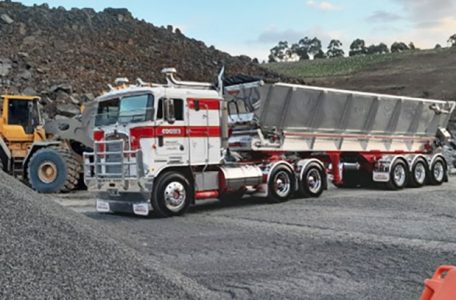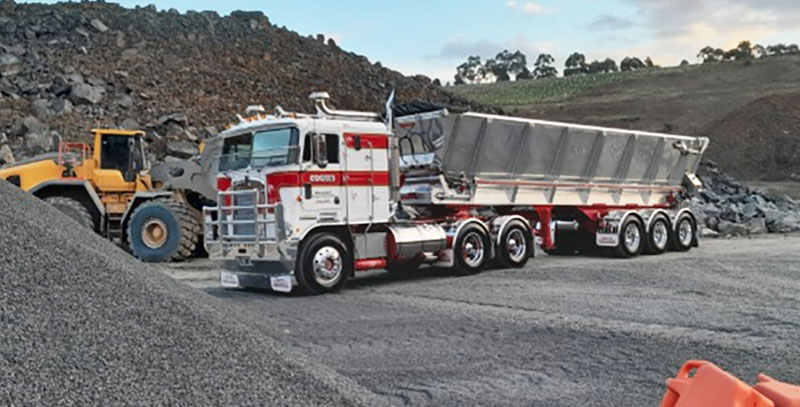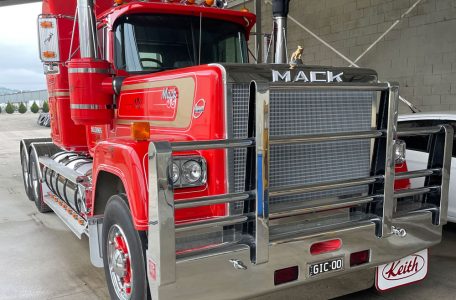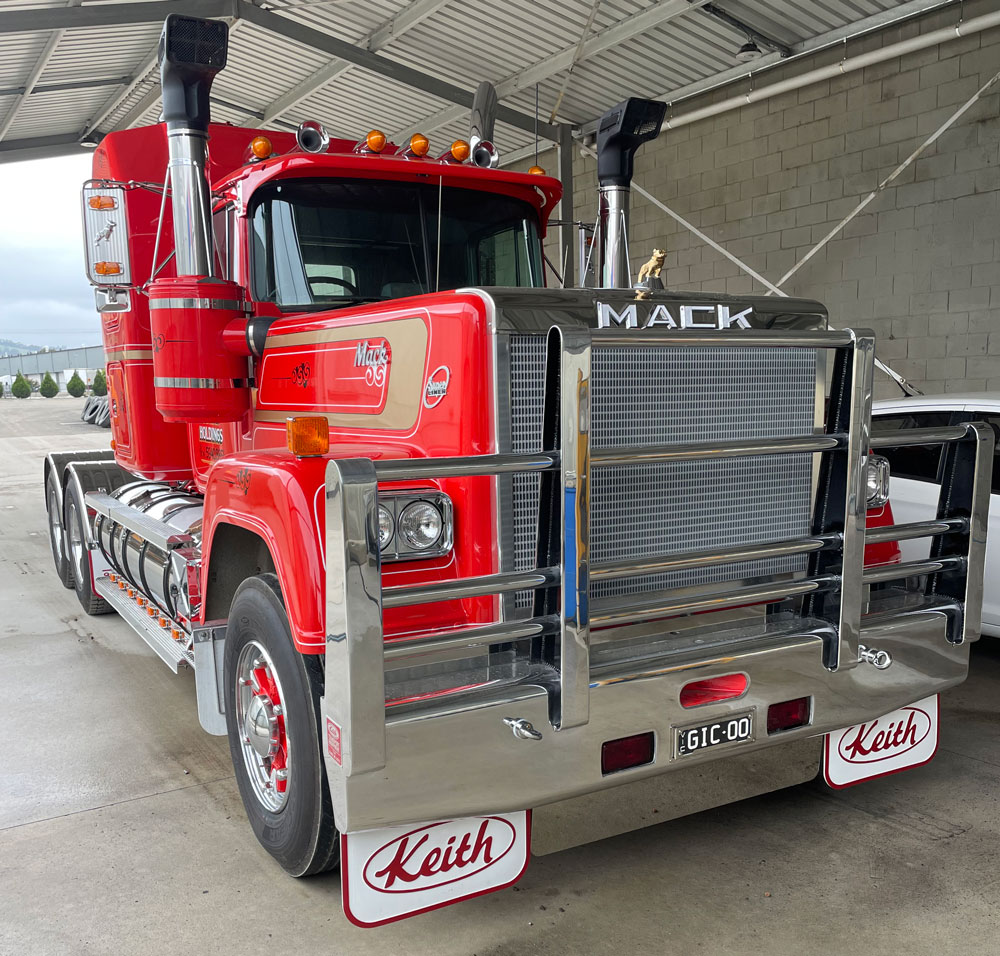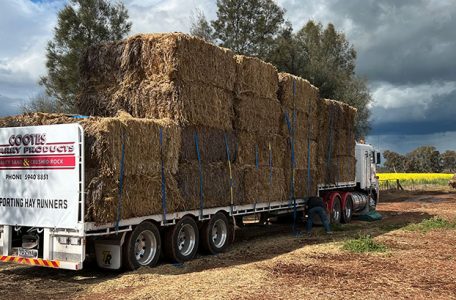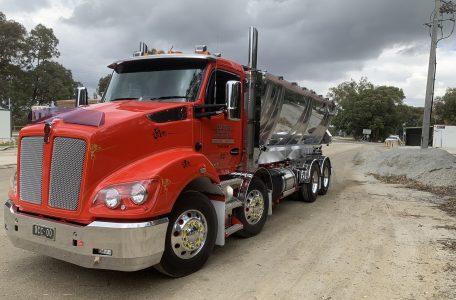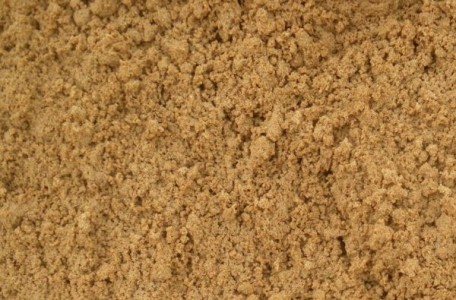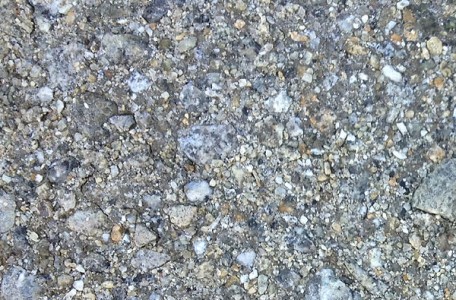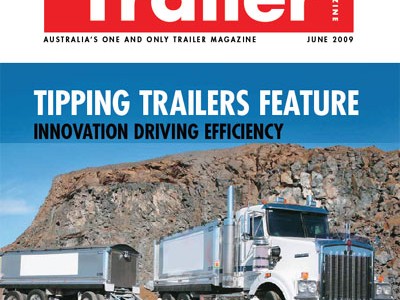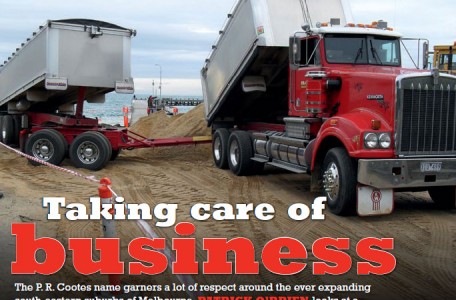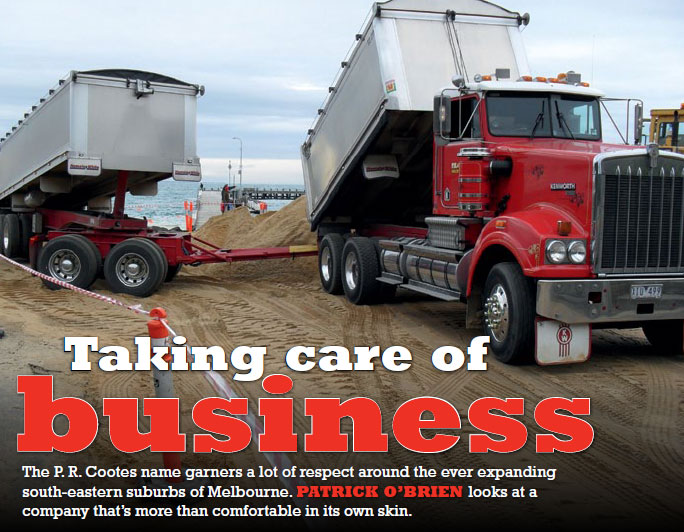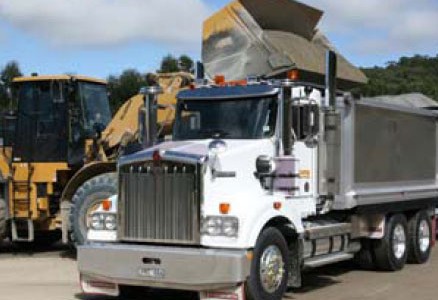Our new live bottom trailer is hard at work.
- Home
- Products
- Online Quotes
- Online Orders
- Workshop
- Fleet Profile
- Contact Ph.5940 8851
- About Us
- History
- Gallery
- News
- Terms & Conditions
All posts in News
Cootes Quarry Products are proud announce our recent appointment as UDIA Victoria (Urban Development Institute Australia) Members.
In addition, Business Development Manager Olivia Cootes has recently been appointed to Co-Chair of the UDIA Victoria Outlook Young Professionals Committee for FY 2023 – 2025.
We look forward to promoting greater engagement within the industry and support UDIA policies to support development and growth in Victoria.
The composition of sand varies and making sure you are using the right type for the job at hand is very important. Below is a list of some of the sands used in the building and construction industry, if you have any questions about what sand would best suit your requirements then please call the friendly and helpful staff at Cootes Quarry Products.
Concrete sand is Normally naturally occurring washed sand with a particle size less than .5mm. Manufactured sand is normally a quarry dust produced by the crushing of rock.
Ménage sand is very fine washed processed sand without stone. Holcim has a wide variety of sands available including ménage sand which is suitable for use in construction of horse arenas and training rings.
Turf Sand is widely used throughout the golf and sporting industry, a topdressing material that can be used in a multiple of applications. From top dressing greens and fairways to sports fields and landscaped parklands.Turf Sand is washed and graded sand specifically produced for the horticultural industry.
Brick Sand is fine in texture and high in clay content and used in mortar for brick and stone work. Brick sand can also be used in sand boxes and as a base for above ground swimming pools.
Filter Sand is sourced fromis normaly sourced from river system, this sand has the ideal angularity, size, spherity and hardness for the most efficient filtering of water.
Pipe Bedding Sand is a medium grade washed river sand used for a variety of applications, most commonly in plumbing and as a bed for laying paving.
Crushed Rock is exactly what it sounds like, rocks that have been crushed or broken down by crushing machines. Its main uses are as an aggregate for construction and landscaping purposes. Since crushed Rock is produced rather than formed naturally, it can be made in different sizes.
Crushed Rock is used in paving blocks and concrete for sidewalks, driveways, patios, homes, office buildings and paved roads as a base or sub-base material or in the process of cement manufacture.
Mixed with a binder to make asphalt and tarmac, Cruched Rock is used for road construction where the strength of the road depends upon the interlocking of the stones due to their angular shapes.
Placed on the ground in landscapes around trees, drains and as tracking pads on construction sites. Tracking pads are temporary roadways used to prevent sediment from construction getting on public paved roads or landscaping.
Trailer Mag June 2009
Paul Cootes of PR Cootes Holdings Pty Ltd has been operating Hamelex White tipp ers since becoming involved with CEMEX thr ee-and-a-half years ago, and looks set to add another unit to his fleet.
Having been in the transport game for the last 24 years, Paul understands the importance of running a quality fleet that he can depend on. Paul currently runs 13 aluminium tippers, 10 of which have been designed and manufactured by Hamelex White. A new order will bring this figure up to 14.
“We have just ordered a PBS approved aluminium quad-tipper that will have a 57.5 tonne gross mass. The design process has already been finalised and it looks likely to be delivered in August this year,” Paul says. Prior to this order, Paul’s most recent addition to his fleet was a tri-axle super dog that was delivered in March and is currently in operation (see box for specs). He says, “It has been performing very well since being put to use a few months ago. This unit is being used to deliver to CEMEX concrete plants and for the crushed rock demand work, largely for road construction, that is running out of CEMEX quarries throughout the south-east of Melbourne. Like a large portion of the vehicles operating under CEMEX, this vehicle has already been fitted with the Body Up alarm system and other unique safety features jointly designed and implemented with CEMEX.
“The support we have had from Gary Clarke from CEMEX has assisted us with a continuous improvement approach to the practical design of these assets once operating in the field. Other features include wheel nut indicators, blind spot mirrors, ladder design, grain door latches, and a risk management approach to signage within the cab for body and truck heights as well as overhead electrical hazards.” John Koutsogiannakis is the driver of this triaxle super dog and he couldn’t be happier with the new unit. “Basically, it’s a clean, well built unit. People have stopped me on several occasions out on the road, to comment on how great the vehicle looks and in the two months that this vehicle has been in operation, there hasn’t been an ounce of worry,” says John.
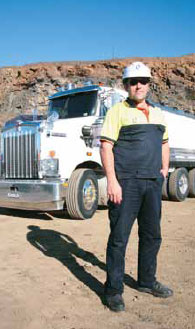 Staying close
Staying close
The fact that the long-standing partnership between Hamelex White and Paul Cootes has continued to develop over the years is down to the close relationships that have formed between the two companies. As Craig Wallace of Hamelex White explains, “Paul has worked closely over the past few years with Alan Beggs, who is our Spare Parts, Repair Bay and Service Manager for Victoria. Alan has made several visits to the PR Cootes facility. “As with all of our clients, we focus on listening to what the customer wants and putting that into practice when building their unit. “That’s why when we deliver the trailer, there are no surprises; we build exactly what our customers ask. “Hamelex has a detailed process that it goes through in order to achieve that reliability, including confirming the full layout and the complete spec details. By the time we deliver our units, there is no hold-up, they can be put straight to work without any dramas.”
Craig adds, “Paul Cootes is one of the major contractors for CEMEX and is well respected within the industry. He is known to be innovative and is always looking at how he can maximise payload through new technology, to benefit not only himself, but also his customers and the safety of his drivers.”
From Paul’s perspective, local back-up support was a key factor influencing his decision to order another tipper from Hamelex White. Other considerations that came into play were tare weight, build quality and the ability of Hamelex White to deliver the trailers on time, every time. “I have been using Hamelex White tippers since buying the business, so I basically inherited a Hamelex White fleet and have decided to keep on going that way,” he says. “The people at Hamelex White are always very proactive in their approach. They are very service and quality focused, which is exactly the way that we operate.”
The Hamelex White Super Dog This tri-axle super dog measures 5.9 metres long and a sliver under 1.3 metres high. It has been fitted with York axles and suspensions, pre-set hubs, Edbro hoists, Camilleri tarp, CentriFuse brake drums, automatic slack adjusters, and an automatic axle lift which operates through the air bags. When the trailer is laden, the axle lift senses the pressure on the air bag and duly lowers the axle; when the trailer is unladen, the axle notes the reduced pressure, thus enabling the axle to lift off the ground, therefore reducing tyre wear and increasing fuel economy. To finish, the super dog is fitted with Alcoa aluminium wheels, Durabrite polished on the outside, and Michelin XTE2 tyres. Hamelex White prides itself on its reputation for building strong and innovative equipment. Attention to design and a strong customer focus allows Hamelex White to cater for a wide range of unique requirements, using a mix of aluminium and steel blends. As one of Australia’s largest trailer manufacturers, Hamelex White’s trailers are backed up with the experience and expertise of a large number of distributors across the country and are all supported by a two year warranty.
A quick look at its vehicle fleet can reveal much about a firm’s approach to business. Take the Cootes Quarry Products’ line-up, for example. It comprises 19 truck and dog tipper combinations with trailers of varying descriptions, including one five-axle, half a dozen tri-axle and 12 quad-axle units. Continuing the diversity, the equipment comes from a trio of trailer manufacturers, namely Hercules, Hamelex White and Chris’s Body Builders.
The majority of the fleet is signed up for sub-contracting work to a couple of concrete producers, with Cootes supplying nine vehicles and drivers to Holcim and three to Broadway & Frame. The remaining seven are dedicated to Cootes’ own work in what has become a fairly sizeable customer base. The jobs include quarry work for the new estates populating Melbourne’s south-east, road extensions, garden supplies and even repairing beaches along the Mornington Peninsula.
Leigh Smith, fleet manager at Cootes Quarry Products, explains how the current situation came to be and why it works so well for the company. “Our business model has basically evolved from a starting point just over six years ago when the entire fleet was contracted,” Leigh begins. “When it came time for one of the trucks to come out of contract we decided to hold onto it for use as a substitution unit when the others were in the workshop for servicing
or repairs, as well as to pick up a bit of extra work to cover the costs of keeping the truck. “That was the foundation of our current customer base,” he continues. “We picked up a couple of very good customers at the time and it kept growing organically from there. “We subsequently upgraded the fleet for
the sub-contracting work and retained the older ones to keep this additional line of work ticking over. There are a couple of newer units among the group, but we basically just keep the trucks to do our own work. We have a 1995 Kenworth that’s done 1.6 million kilometres and is still going strong. It’s a beautiful truck. I reckon it drives as well now as it did brand new. “Even though they’re not new, they’re far from being second best,” Leigh adds earnestly. “It all comes down to how you look after them, making sure everyone treats them with the respect they deserve.” In fact, words like ‘respect’ and ‘care’
come up often when speaking with Leigh, seemingly representing the building blocks of the company’s ethos and the motivator behind how everything is done.
For instance, presentation is of utmost importance for Leigh and the company’s owner Paul Cootes. It stands to reason though because Paul is, in fact, the son of Ian Cootes whose fuel and gas haulage operation was famous for its pristine presentation of trucks and tankers. However, as Leigh points out, presentation extends beyond the customer base to the general public as well. That’s why a Hercules bodied truck will only be seen hitched to a Hercules dog, a Hamelex coupled with a Hamelex and so on. Plus, each vehicle is cleaned and polished every day before it hits the road, always giving the right impression when it’s out there doing the work.
As for why Cootes is happy for a few different trailer and body brands to populate its fleet, it seems the reason is nothing more complicated than keeping up with the best the industry has to offer. “Our relationship with each of the trailer builders is very good,” Leigh Smith confirms, “and we tend not to favour one over the other. We had a lot of Hamelex gear early on and have always been happy with the service. The same is true with Hercules. With Chris’s Body Builders, we heard about the PBS (performance based standards) three-axle dog the company designed; so we went over to have a chat about it, ended up buying a couple and they’ve worked out very well for us. “It’s just nice to have a few different names throughout the company, to keep up with what’s new and different among the builders around the place. Our specs are pretty similar in regards to running gear, mostly York and Hendrickson, and we’ll only change things occasionally. For example, we tried disc brakes for a while on our tippers but found maintenance costs were higher so we ended up going back to drums. “Usually, we’re only concerned with improvements in tare weight and payload capability. So we simply keep in touch with the manufacturers and look to them to see what they can offer us.”
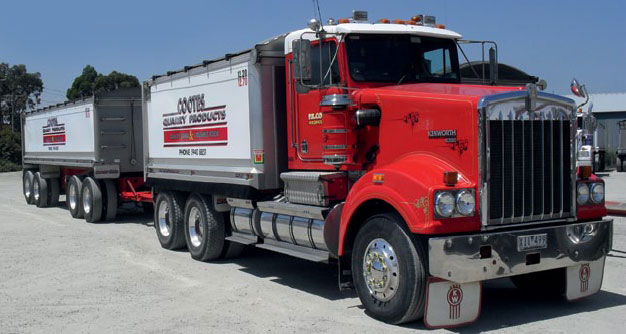 When it comes to upkeep, taking care of three different brands poses no problems for the Cootes maintenance team comprising two mechanics and two apprentices. According to Leigh, aside from the odd warranty issue, it’s not often that a Cootes trailer is sent back to the dealer because everything that can be done in-house is taken care of, regardless of the brand. “Generally, the trucks and trailers are brought in for a maintenance check every two to three weeks,” he explained. “We can pretty much handle everything here and to be honest that suits us perfectly. We probably do things a bit differently to others, as well. That’s not to say we’re better than anyone else, we just have our own way of doing things that works for us.”
When it comes to upkeep, taking care of three different brands poses no problems for the Cootes maintenance team comprising two mechanics and two apprentices. According to Leigh, aside from the odd warranty issue, it’s not often that a Cootes trailer is sent back to the dealer because everything that can be done in-house is taken care of, regardless of the brand. “Generally, the trucks and trailers are brought in for a maintenance check every two to three weeks,” he explained. “We can pretty much handle everything here and to be honest that suits us perfectly. We probably do things a bit differently to others, as well. That’s not to say we’re better than anyone else, we just have our own way of doing things that works for us.”
It also appears the P. R. Cootes way works well for others, too, because an increasingly important part of the business involves carrying out repairs and roadworthiness checks for other transport companies. Not only does this help keep the workshop busy during those quiet times when the fleet is out on the road, it’s a handy little earner that boosts the bottom line nicely. After all, if you have the facilities including the workshop and a well-trained staff, why not make the most of it? The idea has proven such a success that Leigh reckons they’re now doing two or three vendor jobs every day. “We’ve always had to do the annual roadworthy checks for the companies we’ve been working for over the years, so we decided to expand on this and offer our services out,” he explains. “From a scheduling point of view, the business has to be flexible enough to work around other people’s schedules. You might need to shift a job around to fit it into a Monday, for example, because that’s an RDO (rostered day off) for the building industry, whereas Tuesday and Wednesday will be flat out. “Basically, it all comes down to caring about your job. It’s good to know that there are extra things we can do to help our customers and it’s actually an honour to have them trust us enough to bring their own trucks and trailers in to get serviced. It’s important for us to service their gear up to the same level as our own. In a way, I guess, we’re trying to raise the overall standard of the tipping industry.”
This commitment to raising standards is also seen in the approach Cootes takes to its apprentices. The reality is that along with assing on the values that define the Australian trucking industry – including quality service, innovation and reliability – companies like Cootes are responding to the new challenges facing the next generation. At Cootes, for example, an apprentice can be found helping take care of the truck and dog combinations every afternoon and Saturday morning. The drivers will usually get back to base around 3.00 pm and team up with the apprentice to wash and polish the vehicles. In this way, the older generation is teaching the next one about the importance of having pride in what they do.
Leigh also knows that computers will be playing an increasingly important role by the time his apprentices’ careers are in full swing. “We’ve had two apprentices since I’ve been here and it’s been great to pass on the knowledge I’ve picked up over the years to a new generation. You have to keep in mind, though, that some of the stuff I’ve seen in my time is a lot different to what the young guys are seeing these days. Computers are such a big part of the job, the electronics and so on,” he says. Still, as Leigh points out, while anyone can plug in a diagnostic kit, having a good knowledge of the basics of mechanics will never go out of fashion. “You need to have the fundamentals. I reckon that starts way back even before they begin their apprenticeship. If you have a kid who’s taking apart lawnmowers or messing with cars when they’re 14 or 15, they have that knowledge of how machinery works before entering the workforce. From then on you’re always learning; I’m still finding out about things every day. If you’re not continually learning, you’re not trying hard enough is the way I look at it.”
Payload performance
The sizeable area covered by Cootes – from Hallam in Melbourne’s south-east and much further east to Bairnsdale and up into the steep hills around Myrtleford – obviously includes a significant number of roads through a few different shires, each with their own rules and regulations. With this expansive reach comes the onerous task of paperwork, which becomes further complicated when PBS (performance based standards) is thrown into the mix. Yet, as Leigh explains, the extra payload makes it all worthwhile.
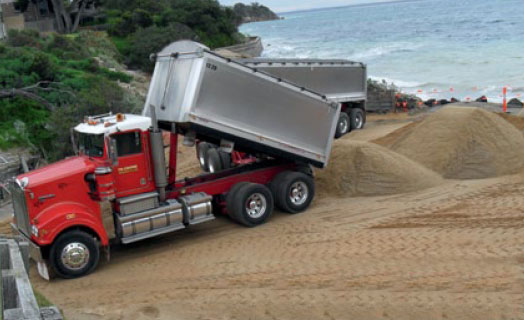 “It’s a big job in itself, taking care of all the permits, especially when we get work outside our usual areas,” he says. “Although it’s time consuming, it’s actually not that hard to meet all the requirements. “The five-axle dog has certainly come in handy here. Getting that extra payload on those longer journeys makes it worthwhile because we’re essentially running a couple of extra trucks without having to increase the size of the fleet. It costs a bit to get accredited but after that we can work on keeping the price low for customers so we can supply our services at the right price. “PBS has enabled big changes over the last five years, causing the length of the trailers to grow. It’s also made a difference to the maintenance side of things, you notice a few parts succumb to wear and tear a bit faster now. For example, drawbar bushes seem to wear out quicker than before. Most of the extra weight – as much as six or seven tonnes – is going on the trailer, so it’s only natural those bushes are taking more strain. “It’s not a massive difference, but you do notice it. We’re also aware of the impact on the brakes. Obviously they’re doing it a lot tougher slowing down that extra weight.”
“It’s a big job in itself, taking care of all the permits, especially when we get work outside our usual areas,” he says. “Although it’s time consuming, it’s actually not that hard to meet all the requirements. “The five-axle dog has certainly come in handy here. Getting that extra payload on those longer journeys makes it worthwhile because we’re essentially running a couple of extra trucks without having to increase the size of the fleet. It costs a bit to get accredited but after that we can work on keeping the price low for customers so we can supply our services at the right price. “PBS has enabled big changes over the last five years, causing the length of the trailers to grow. It’s also made a difference to the maintenance side of things, you notice a few parts succumb to wear and tear a bit faster now. For example, drawbar bushes seem to wear out quicker than before. Most of the extra weight – as much as six or seven tonnes – is going on the trailer, so it’s only natural those bushes are taking more strain. “It’s not a massive difference, but you do notice it. We’re also aware of the impact on the brakes. Obviously they’re doing it a lot tougher slowing down that extra weight.”
Craig Wallace, general manager of Hamelex White, says that for a manufacturer like Hamelex White the main difference in the bigger builds is in the overall size increase – everything else is simply business as usual. “The drawbar bushes and the rest of the running gear are just the standard components we’ve always used,” Craig confirms. “It’s probably fair to say that we’ve always chosen gear that will stand up to a bit more weight, anyway. “But like Cootes, we’ve noticed the brakes are wearing somewhat quicker than normal.
Tyres are also wearing a bit faster as well, usually needing replacement around the 90 to 100,000 km mark. We’ve had a few comments about the tyres, but when you’re carrying extra weight you just have to accept that this is going to happen to a certain degree. It’s not a fault in the design of anything.” Alan Beggs, Hamelex White’s service repairs manager, adds that it’s the single operators who are raising questions more than the bigger players. Going from six-axle units hauling 45 tonnes to seven-axle combinations with 57.5 tonnes is a big jump. The bigger fleets seem to have realised that with extra payload comes extra strain on the vehicles. The obvious response is to increase the frequency of maintenance schedules. “I think that’s probably the best advice,” Alan adds. “We don’t feel we need to send any specific feedback to our suppliers. Overall the PBS builds are going very well and the tyre and brake manufacturers are always improving their products.” A great tip.
Leigh himself began his trucking career as an apprentice, spending six years at Kitco Transport in the small town of Koo Wee Rup. At the end of his apprenticeship he started looking after the Kitco workshop, soaking up the knowledge passed down by the older generation of blokes there. Looking for a change, Leigh began driving tippers with three and four-axle dogs in tow for Paul Cootes. Eventually though, the lure of the workshop proved too great and he relinquished the driving role to take up his current position. That was about four years ago and Cootes has since grown from employing one mechanic who also did a bit of driving on the side to its current size. “My father, who was in the tipper game as well, said to me years ago that if you’re going to go driving, do tippers,” Leigh reveals. “It’s a great job, but it can be hard. There’s a lot more skill involved than people give you credit for. It’s not just driving a dirty tip truck around the yard and tipping off some gravel. Plus you’re not just on a road, you’re in building sites and paddocks, all
sorts of conditions. It’s very challenging and punishing work and to do what these guys do every day is pretty impressive. “Our drivers know what they’re doing, they understand everything. We get customers asking us for advice on how to handle different materials and the drivers have been doing it long enough to know the answers. It also helps when someone new starts. If they have any questions, they know they can give one of the ‘old hands’ a call and the problem will be solved straight away. It’s all about caring about the state of the industry.”
 ABOVE: The PBS approved four axle dog trailer has further increased productivity levels of PR Cootes Holdings Pty Ltd.
ABOVE: The PBS approved four axle dog trailer has further increased productivity levels of PR Cootes Holdings Pty Ltd.
Hamelex White is highly regarded for delivering quality tipping solutions based on performance and durability and now, through the PBS (Performance Based Solutions)assessment program, customers such as PR Cootes Holdings Pty Ltd, who recently added a PBS approved four axle Hamelex White Dog Trailer, have the opportunity to further increase the productivity of their quipment. For the uninitiated, PBS (Performance Based Standards) offers the potential for heavy vehicle operators to achieve higher productivity and safety through innovative vehicle design.
These gains are typically not available under conventional ‘one size fits all’ prescriptive mass and dimension rules or the state-based permit system. Applications for SMART heavy vehicles are considered by a PBS Review Panel (PRP). The Hamelex White four axle dog aluminium trailer has been an important addition to the PR Cootes Holdings fleet of 15 trailers, as it is being used to cart quarry products around eastern Victoria for Holcim Australia Pty Ltd, one of Australia’s leading suppliers of aggregates, concrete and other related products with over 100 years of experience.
Holcim also plays a significant role in obtaining the productivity benefits by ensuring the ordering and scheduling processes are route assessed and that all Holcim Quarries and loading point weighbridges are conversant with the permit obligations Training and Safety Supervisor at Holcim, Gary Clarke, ensured that there was a smooth implementation between the drivers, quarries and their Customer Service Centre. And as Paul Cootes of PR Cootes Holdings Pty Ltd explains, this tipper is doing its job perfectly. “Having PBS approval on this unit is already providing phenomenal benefits,
it has increased productivity by around 20 percent. It’s just terrific and so versatile.”
“This combination can be delivering to a rural roadside delivery in the morning and a metropolitan concrete plant in the afternoon if need be with the same level of productivity that is expected from a B-double. It’s basically hauling B-double weights but has greater flexibility in terms of where it can travel and a far lighter tare weight for the same gross mass. Permits are required to travel along B-double routes however flexibility can be achieved by working with local councils for concrete plant access and less prominent roads in the network. I would say that the versatility of this unit is by far, one of its greatest advantages.”
With over 24 years of experience, Paul Cootes is no stranger to the transport industry, and running a safe, efficient and reliable fleet is always high on his agenda. His business practice thrives on continuous improvement and Paul will only place a driver that has a Multi Combination licence into any of his PBS vehicles, as they are carrying similar weights to a B-double. TDT Driver Training in Dandenong recently provided three of Paul’s drivers with the MC endorsement, which heavily focuses on route planning and other skills that complement vehicles carrying higher mass weights.
“The PBS scheme does not require an MC licence as part of the criteria, but from a best practice point of view, I believe it to be beneficial,” he says.
This new tipper is the fourth PBS approved unit purchased by PR Cootes Holdings Pty Ltd, all of which were designed and manufactured by Hamelex White. The first three PBS approved units have a 56 tonne gross mass, while this is the first to have 57.5 tonne gross mass, enabling it to carry up to 40.6 tonne payload. Amongst those impressed with the capabilities of the new trailer is its driver, Sebastian Kuyer who says, “It actually handles better at 57.5 tonne than it does at 50 tonne.” PBS certifier, Bisitecniks played a large role in enabling the PR Cootes Holdings Pty Ltd units to obtain PBS permits. “The main elements of PBS approval are vehicle access in terms of where the vehicle is permitted to travel; specifications, which need to go into great detail for the assessment; the inspection of the equipment; and the final approvals and permits,” explains Paul Walsh of Bistecniks.
“For any vehicle that can’t comply with the prescriptive regulation, PBS is really the only avenue available, and what PBS approval generally means is higher productivity. The types of vehicles that PR Cootes Holdings Pty Ltd operates are achieving significant increases in weight because of PBS.” As part of providing enhanced safety, the four axle dog trailer has been fitted with a body-up alarm system. This system provides drivers with an audible and visual alarm to indicate that the tipper body is elevated and helps prevent it from contacting overhead hazards, including powerlines which can cause a significant risk to the driver. This system works through the truck hydraulics and registers any pressure on the hoist, which triggers the audible tone and LED display in the cabin of the truck. An additional mirror has been fitted at the front of the truck to eliminate blind spots. Further to this, extra lighting helps to provide increased visibility. The tipper has been fitted out with Narva LED stop/tail lights, side lights, and reflectors to the rear and sides.
“Hamelex did a very good job in building the unit to exacting specifications which is vital when seeking PBS approval,” states Paul Cootes. “It’s a very precise methodology so you need everybody to do their job to the millimetre. I would like to acknowledge the cooperation we had between Hamelex White, its suppliers and the consultant Bisitecniks in order to get these approvals and get the unit out on the road.” Hamelex White has a proud and long-standing relationship with PR Cootes Holdings Pty Ltd, and focuses on delivering the same quality of work and ongoing service to all transport operators who require customised trailer and tipping solutions.
Cootes Quarry Products is a family owned company dedicated to supplying the construction industry with quality quarry products in Melbourne and South East Victoria. Our fleet of trucks enables backloading opportunities across the quarry networks reducing freight costs to the end user. We do not double handle materials all deliveries are direct from the production point and weighed into our trucks by a certified weigh bridge. Weigh bridge information is made available to our customers for every delivery. Our point of difference to other suppliers is our fast reaction time to orders and access to high quality products due to our ability to purchase from many Quarries that are ISO 9001 accredited.
- Commercial and Residential Construction
- Landscaping and Parklands
- Road and Highway construction
- Race Tracks, Ménages and Arenas
- Pipeline and Infrastructure development
- Local Government Projects
- Residantial Developments
- Building and Construction Site Access
- Construction Foundations
- Road and Railway Founadations
- Road Surfacing
- Airport Runways
- Residential Landscaping
- Road Base Materials
- Material to Raise and Level Land
- Erosion Protection Projects
- Hospital Construction Projects
- School Construction Projects
- Car Park Construction Projects
- Farming Applications
- Civil Works
- Turfing Underlay
- Top Dressing Material
- Construction Sands
Copyright 2013 Cootes Quarry Products - 50 Mary Street Pakenham 3810 Victoria Australia - Phone (03) 5940 8851 - website by awdesign

